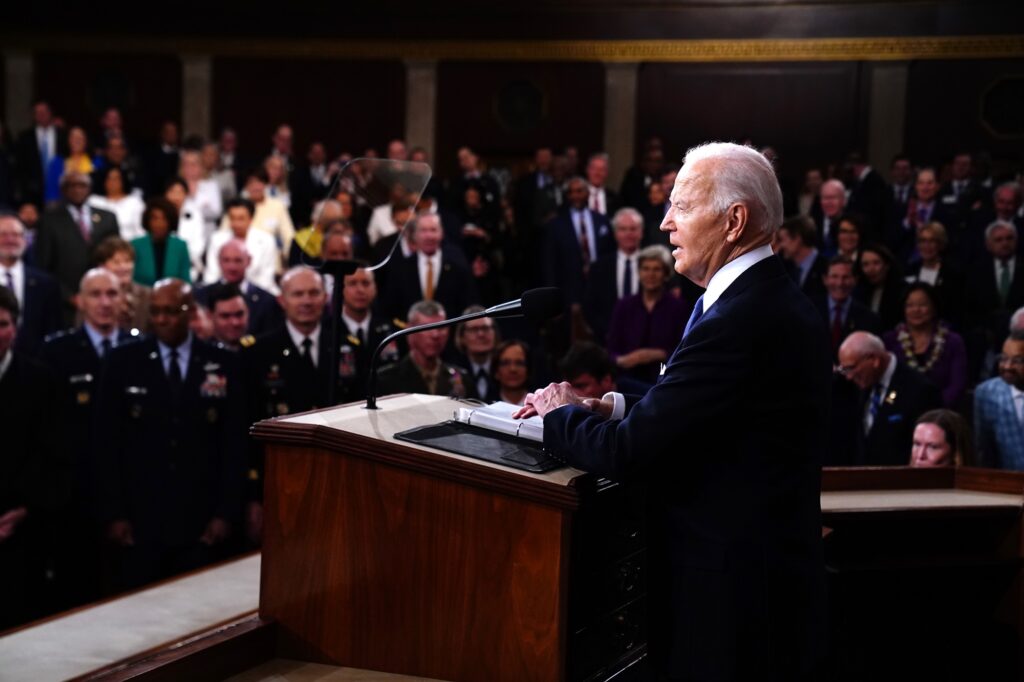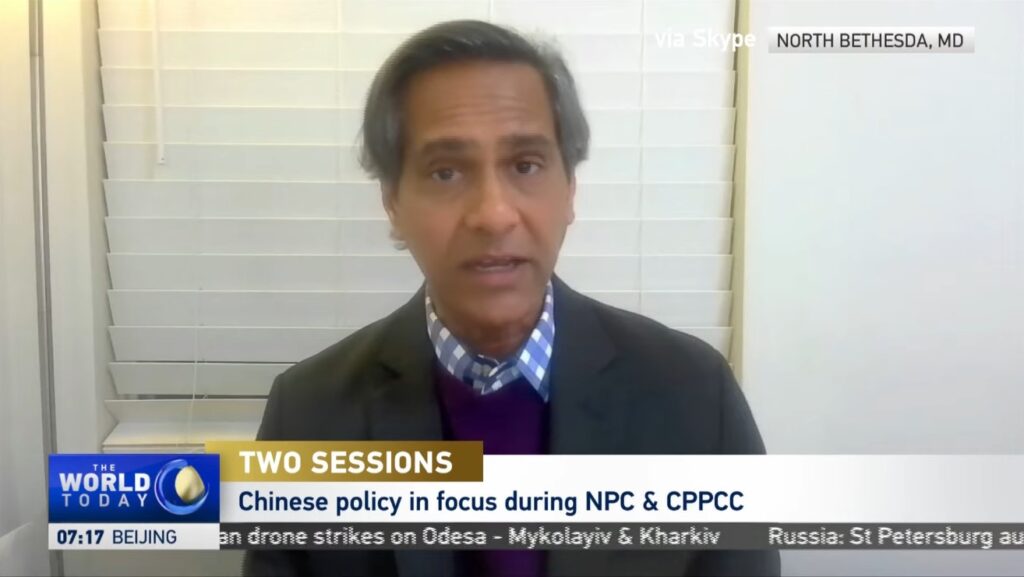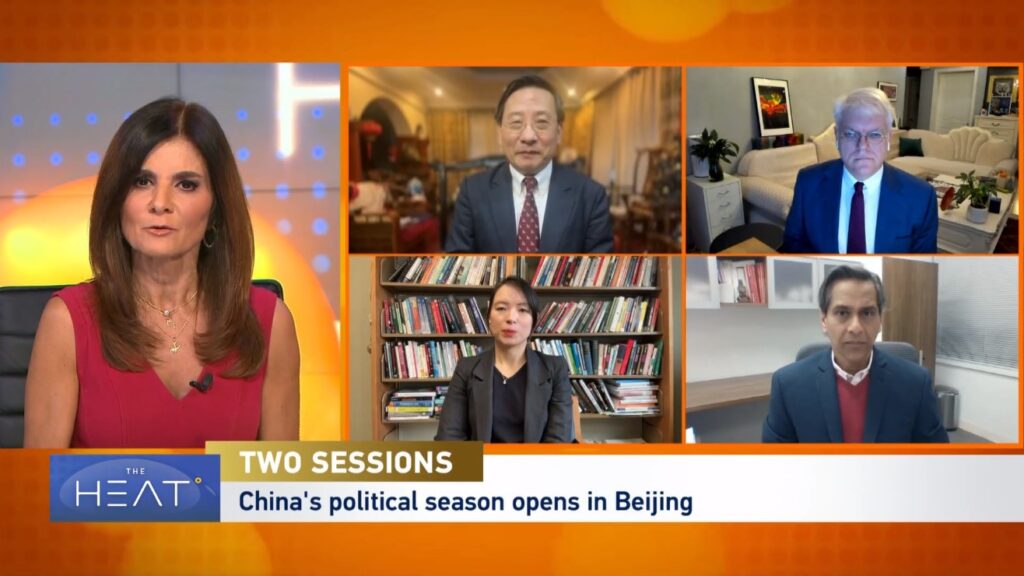
ICAS Bulletin (online ISSN 2836-3418, print ISSN 2836-340X) is published every other week throughout the year at 1919 M St NW, Suite 310, Washington, DC 20036.
The online version of ICAS Bulletin can be found at chinaus-icas.org/bulletins/.

– Taiwan’s vice president-elect, Hsiao Bi-khim, is reported to be in Washington this week for a low-profile private visit, according to sources cited by The Wall Street Journal.
– U.S. Commerce Secretary Gina Raimondo states that the U.S. may further increase controls on China’s access to sophisticated semiconductor technologies to prevent Beijing’s military advancement. The Biden administration is currently considering imposing new restrictions on Chinese tech firms such as ChangXin Memory Technologies Inc.
– On March 8, President Biden briefly criticized China’s “unfair economic practices” in his State of the Union address, potentially displaying a tougher stance than Trump. This follows accusations by China’s Foreign Minister Wang Yi over U.S. containment efforts that Washington has “wrong perceptions” about Beijing.
– China’s Foreign Minister Wang Yi, speaking at a news conference in Beijing on March 7, criticized the U.S. for maintaining incorrect perceptions of China and failing to fulfill promises made since the meeting between Presidents Joe Biden and Xi Jinping last November. Wang emphasized the necessity for mutual respect and recognition of differences for continued bilateral exchanges.
– Daniel Kritenbrink, the U.S. Assistant Secretary of State for East Asian & Pacific Affairs, criticized China’s intimidation tactics in the South China Sea during a press conference in Bangkok, Thailand on March 7.
– Chinese migrants have increasingly adopted the “Zouxian” or “take the risk” trend of entering the U.S. via the southern border, reportedly driven by economic challenges; a fact that U.S. policymakers have continued to take notice of.
Associated News References:
“Taiwan’s vice president-elect is on a low-profile visit to Washington, WSJ reports,” The Print, March 12
“US Will ‘Do Whatever It Takes’ to Curb China Tech, Raimondo Says,” Bloomberg, March 11 [Paywall]
“Biden Targets China During State of Union Speech,” Voice of America, March 8
“US has a wrong perception of China, says foreign minister,” Reuters, March 7
“US diplomat criticizes China for using coercion and intimidation as it presses maritime claims,” AP, March 7
“More people from China seeking asylum at US border,” Deutsche Welle, February 29

– A report released on March 11 from the Office of the Director of National Intelligence states that the Chinese government is utilizing TikTok to advance its global influence operations, aiming to promote pro-China narratives and undermine U.S. democracy.
– On March 8, President Joe Biden announced that he would sign legislation requiring China’s ByteDance to divest the popular TikTok app within six months, despite objections raised by his predecessor Donald Trump.
– American semiconductor company Advanced Micro Devices (AMD) has failed to secure approval from U.S. regulators for a made-for-China AI chip. This chip, designed by AMD to have reduced performance to comply with U.S. export restrictions, was deemed too advanced by the Commerce Department.
– The Biden administration announced an investigation into Chinese-made “smart cars” over potential national security risks, citing concerns about China’s ability to gather sensitive information on American drivers. Also, the Commerce Department will issue a proposed rulemaking to investigate national security risks posed by connected vehicles from China and other hostile countries, seeking input from the auto industry and the public.
– President Joe Biden is expected to issue an executive order aimed at restricting the transfer of sensitive U.S. personal data overseas amid concerns of potential misuse. The order will task the Justice Department with creating rules to safeguard Americans’ genetic, biometric, and geolocation data from access and exploitation by countries of concern, which could include China, Russia, North Korea, and Iran.
Associated News References:
“The Chinese government is using TikTok to meddle in elections, ODNI says,” Politico, March 11
“Biden says he would sign TikTok crackdown, Trump raises concerns,” Reuters, March 8
“AMD reportedly hits U.S. regulatory roadblock for China-tailored chip,” CNBC, March 5
“Biden orders US investigation of national security risks posed by Chinese-made ‘smart cars’,” ABC News, February 29
“US To Limit Sale Of Personal Data To Foreign Adversaries,” Barron’s, February 28

– Following a security probe by the U.S. Congress, Shanghai Zhenhua Heavy Industries said their “cranes will not pose a network security risk to any port” as they are “designed, manufactured, transported, installed, debugged, accepted and delivered in strict accordance with international standards.”
– In late February, the Biden administration announced it would invest to replace foreign-built cranes with U.S.-manufactured ones as part of a set of maritime cybersecurity measures. A congressional investigation of Chinese-built cargo cranes throughout the U.S. resulted in reports of more than a dozen communications modems being found, sparking security concerns in Washington.
– A former Google software engineer and Chinese national has been charged by the U.S. Department of Justice on four counts of federal trade secret theft related to AI.
– In an ongoing trial against Hunter Biden, son of President Joe Biden, investigating his foreign business operations, confirmed Chinese business partners have not yet appeared on the witness list for testimony.
Associated News References:
“A major Chinese crane maker says it’s no security risk to U.S. ports,” Quartz, March 11
“Espionage Probe Finds Communications Device on Chinese Cranes at U.S. Ports,” The Wall Street Journal, March 7 [Paywall]
“Ex-Google engineer charged with stealing AI trade secrets while working with Chinese companies,” AP, March 6
“Hunter Biden’s Chinese Business Partners Keep Quiet in Impeachment Effort,” The Wall Street Journal, February 28 [Paywall]

– China canceled another batch of U.S. wheat export shipments totaling 264,000 metric tons on March 11, marking the third consecutive session of cancellations and bringing the total to 504,000 tons; the highest on record since the USDA began tracking such data in 1999.
– U.S. lawmakers are seeking to reduce reliance on Chinese biotech companies, potentially impacting popular weight loss and diabetes drugs like Eli Lilly & Co.’s Zepbound and Mounjaro, whose active ingredients are supplied by WuXi AppTec Co.
– On March 4, shares of WuXi AppTec and WuXi Biologics surged by 7.3% and 11%, respectively, receding concerns of potential U.S. sanctions after U.S. President Biden issued an executive order restricting activities of genomics companies in the U.S.
– On March 3 in Washington, D.C., U.S. congressional leaders revealed a provision within funding legislation aimed at preventing China from purchasing oil from the Strategic Petroleum Reserve (SPR).
– Boeing announced a $51 million settlement with the U.S. State Department for multiple export violations, including unauthorized downloads of technical data by Chinese employees in China related to the U.S. Defense Department programs.
Associated News References:
“China Cancels Another Shipment of US Wheat,” Transport Topics, March 11
“Weight Loss Drugs Threatened by US Effort to Contain China,” Bloomberg, March 6 [Paywall]
“Wuxi Companies’ Shares Rise on Receding Worries About Potential U.S. Sanctions,” The Wall Street Journal, March 4 [Paywall]
“US funding bill blocks China from buying oil from Strategic Petroleum Reserve,” Reuters, March 3
“Boeing agrees to $51 mln settlement for US export violations, including in China,” Reuters, February 29

– China accused the U.S. of protectionist trade measures as the U.S. Commerce Department announced an investigation into potential cybersecurity risks posed by Chinese electric vehicles and connected cars.
– For the first time, inventors in China have filed more international patents than those in the U.S., marking a significant shift in global science and technology leadership. In 2022, Chinese inventors filed roughly 68,600 patents through the Patent Cooperation Treaty, surpassing the approximately 58,200 applications from U.S.-based inventors.
– The Science and Technology Cooperation Agreement (STA) between the U.S. and China, established in 1979 and renewed every five years, expired on February 27.
– General Stephen Whiting, head of the U.S. Space Command, warned during a Senate Armed Services Committee hearing that China is rapidly advancing its military capabilities in space to counter American satellites and bolster its ability to monitor and target forces on Earth.
Associated News References:
“China Calls Out US for ‘Classic Protectionism’ in Tension Over EVs,” Bloomberg, March 4 [Paywall]
“Patent applications from Chinese inventors pass U.S. for first time,” Axios, March 1
“US-China science and technology cooperation agreement expires,” Chemistry World, March 1
“US Sees China’s Space Threat Growing at ‘Breathtaking Pace’,” Bloomberg, February 29 [Paywall]

“Apple to expand applied research labs in Shanghai and Shenzhen as iPhone sales weaken in world’s largest smartphone market,” South China Morning Post, March 12 [Paywall]
“Exclusive: Former US official’s work for Chinese client stirs concern over disclosure loopholes,” Reuters, March 11
“US steel unions urge Joe Biden to open probe into Chinese shipbuilding,” Financial Times, March 11 [Paywall]
“US lawmakers urge Blinken to ban travel to China’s Xinjiang,” Radio Free Asia, March 7
“US solar wafer build stutters as Chinese surplus bites,” Reuters, March 7
“Imports Under Closely Watched U.S. Trade ‘Loophole’ Surge,” The Wall Street Journal, March 1 [Paywall]
“US says falling trade with China could be positive,” BBC, February 29
“In ‘finance war’ with US, former official says China risks staring down the barrel of a capital conundrum,” South China Morning Post, February 28 [Paywall]
March 13 hosted by Northeastern University
March 13 hosted by Carnegie Endowment for International Peace
March 1 hosted by Cato Institute
February 28 hosted by Center for Strategic & International Studies
March 14 hosted by East-West Center
March 20 hosted by Wilson Center
March 21 hosted by Georgetown University
April 9 hosted by The National Committee on United States-China Relations
May 6 hosted by Wilson Center
Building Blocs in Space Diplomacy: China’s Methodology in Collecting Partnerships for Outer Space and the Evolving U.S. Response
by Jessica Martin
March 4, 2024

Key Takeaways:
Spy cranes or not, the U.S. will come after China’s shipping industry
by Yilun Zhang
March 12, 2024
The clash between the world’s two largest economies in the shipping industry is inevitable and the ‘spy cranes’ probe is just the prologue of this new episode of the U.S.-China strategic competition. U.S. reliance on China for global shipping is the fundamental cause for Washington to come after Beijing over shipping-related issues. Recently reported Biden administration’s concern over America’s “overreliance” on Chinese cranes is merely just the tip of the iceberg…
Key transformations needed to galvanize China’s economic resurgence
by Sourabh Gupta
March 6, 2024
On the back of a strong 5.7 percent growth rate in 2021, US President Joe Biden boasted that for the first time in 20 years, the US economy had grown faster than China’s. The boast was misleading. China’s economy grew one-and-a-half times faster, registering 8.4 percent growth in 2021. Undeterred, Biden bragged in a Twitter post in December 2022 that the US would “grow faster than China’s economy” in 2022. Despite registering one of its weakest growth rates since the inception of reform and opening-up, China’s growth rate of 3 percent in 2022 was again one-and-a-half times faster than that of the US, which saw growth of 1.9 percent that year…
This commentary was originally released by China Daily on March 4, 2024.
Renewal of US-China STA requires reasonable minds to prevail
by Denis Simon
March 4, 2024
Many scientists and researchers in the US and China are continuing to sit on the edge of their seats as they await the final decision on the possible renewal of the US-China Science and Technology Cooperation Agreement (STA). The agreement, which expired in August 2023, was extended by Beijing and Washington to allow for six months of negotiations to develop a new, more relevant agreement. The STA is important as it serves as an umbrella for all activities in the science and technology (S&T) realm. It also holds symbolic value insofar as its existence implies that S&T cooperation has the blessing of both Beijing and Washington.
Since the original agreement was signed in 1979 and many cooperative activities have occurred under the so-called umbrella, a series of new, pressing issues have moved to center stage in terms of constraining or limiting productive engagement in science and technology…Unlike the broad agenda in the past, the US would like to concentrate on a much narrower group of subjects such as climate change and global health, while the Chinese side would prefer to see a more open-ended set of topics…
This commentary was originally published by Global Times on March 4, 2024.
Event Summary: Secretary Raimondo: An Update on CHIPS Act Implementation, CSIS
by Ao Gu
March 1, 2024
On February 26, Center for Strategic and International Studies (CSIS) Renewing American Innovation Project hosted an event inviting U.S. Secretary of Commerce Gina M. Raimondo to discuss “Investing in Leading-Edge Technology: An Update on CHIPS Act Implementation.” CSIS Senior Fellow Sunjai Shivakumar moderated the event with two sections. Initially, Secretary Raimondo gave a presentation about the status quo of the current CHIPS Act with associated opportunities and challenges. Following this, CSIS Senior Adviser Dr. Charles Wessner held a fireside conversation with Secretary Raimondo regarding several issues related to the CHIPS Act…
On Saturday, March 9, 2024, Senior Fellow Sourabh Gupta was quoted by China Daily on China’s growth target for 2024 in the context of the Two Sessions meeting
On Friday, March 8, 2024, Senior Fellow Sourabh Gupta reviewed the outcomes of the Two Sessions meeting on CGTN America’s The Heat.
On Sunday, March 3, 2024, Senior Fellow Sourabh Gupta previewed the upcoming Two Sessions meeting in Beijing on CGTN America’s The World Today.
On Sunday, March 3, 2024, Senior Fellow Sourabh Gupta was interviewed about the preparations leading into the Two Sessions meeting on CGTN America.
On Saturday, March 2, 2024, Senior Fellow Sourabh Gupta and Distinguished Fellow Denis Simon were quoted by China Daily on the status of the US-China S&T Agreement negotiations
On Thursday, February 29, 2024, Senior Fellow Sourabh Gupta was quoted in South China Morning Post on panda diplomacy.


On Wednesday, February 28, 2024, the ICAS Trade ‘n Technology Program Event on US-China Science and Tech Agreement renewal was referenced by China Daily.
On Tuesday, February 27, 2024, the ICAS Trade ‘n Technology Program Event on US-China Science and Tech Agreement renewal was referenced by Voice of America.

The Institute for China-America Studies is an independent nonprofit, nonpartisan research organization dedicated to strengthening the understanding of U.S.-China relations through expert analysis and practical policy solutions.
1919 M St. NW Suite 310,
Washington, DC 20036
icas@chinaus-icas.org
(202) 968-0595
© 2025 INSTITUTE FOR CHINA-AMERICA STUDIES. ALL RIGHTS RESERVED.